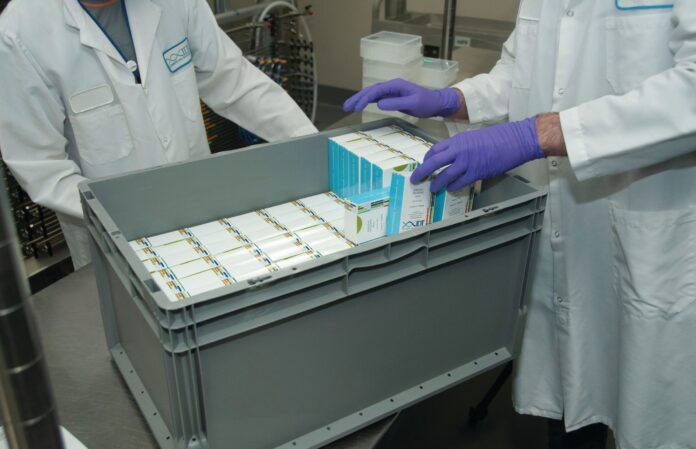
Workers at Integrated DNA Technologies package test kits for distribution. CREDIT IDT
By CBJ News Staff
[email protected]
With the Corridor’s strength in biomedical research and development, advanced manufacturing and engineering, it’s little surprise that our region would have a role to play in combatting and recovering from the COVID-19 pandemic. What’s unique is the creativity being leveraged by local tech companies and the speed with which they are innovating.
Coralville-based Integrated DNA Technologies shifted its operations quickly to become the first company in the nation to have its primer and probe kits approved by the U.S. Centers for Disease Control and Prevention for use in COVID-19 testing. VIDA Diagnostics has already put its AI-powered lung imaging and analysis solution to work helping to monitor patients infected with the coronavirus, while Iowa City’s Rantizo is adapting its drone spraying platform to be used for the disinfection of stadiums.
INNOVATION WATCH 2020
The CBJ presented its first-ever virtual Innovation Watch event on May 13, featuring Susan Wood, of VIDA Diagnostics; Trey Martin, of Integrated DNA Technologies; Mike Courtney, of RSM US LLP; and Michael Ott, of Rantizo. The free event, presented with support from RSM US LLP, continues to be available for viewing at corridorbusiness.com/video-gallery. The following are a few of the stories and takeaways from speakers at the event. Share your own takeaways at the CBJ’s social media pages, #CBJinnovation.
IDT helps world test, research vaccines for COVID-19
Integrated DNA Technologies (IDT) has become a key test kit supplier in the fight against COVID-19 almost overnight, while continuing to supply synthetic gene fragments to researchers working on a vaccine.
The company, a division of Danaher Corp., supplies RNA and DNA oligonucleotides, and is arguably the most successful University of Iowa spinout company in history. With a base of 130,000 global customers, it ships about 4,000 orders per day, mostly from researchers working in genetic and therapeutic fields.
In a video shared on the CBJ Innovation Watch webcast, IDT President Trey Martin described the lightning-fast sequence of events that brought IDT into the COVID-19 fight. It began on Jan. 27, when a panel of probes and primers to detect the illness was issued by the U.S. Centers for Disease Control and Prevention (CDC).
“We were able to develop a stock product to run these assays, and basically posted the preorder online the next day, and by Feb. 10, we started fulfilling orders for a research kit that followed the designs and protocols of the CDC,” Mr. Martin said.
About two weeks later, on Feb. 25, the Food and Drug Administration contacted IDT to see if it could support a scale-up of the CDC’s testing effort, Mr. Martin said. The very next night, IDT shipped sample kits, and after a series of validations by the CDC, the company received an emergency use authorization to start selling the kits for use by hygienic and other testing labs.
“On the week of March 9, within one week, we’d manufactured 2.5 million reactions worth of material,” Mr. Martin said, explaining that each of the boxed kits can test 500 samples.
A week later, IDT was producing enough test kits for 5 million reactions per week, Mr. Martin said, and the company recently surpassed the 30 million mark. However, IDT’s kits alone aren’t enough to meet the needs of COVID-19 testing.
“Specifically, you may have heard in the news that once we helped alleviate this bottleneck for primer and probe kits, there were other supply chain issues with scaling up the necessary swab kits and the media for transporting the swab kits to the lab,” Mr. Martin said.
Using the swab kits and media are the first two steps required before labs can combine IDT’s primer probe kits with a reagent called a master mix and run a procedure called a quantitative PCR in a small machine where the sample is amplified, Mr. Martin said. If a specific target sequence is detected in that process, it lights up fluorescently and the machine can tell not only that COVID-19 is present in the sample, but the quantity.
Although based in Coralville, IDT has 10 facilities, including a new East Coast facility that opened in Raleigh, North Carolina, and about 1,500 total employees.
Automation helping solve challenges, big and small
As scientists, governments and companies work to analyze massive sets of data in the fight against COVID-19, artificial intelligence and automation technologies are being called in to help. But it’s not just pharma giants and high-tech companies like VIDA Diagnostics taking advantage of these new tools, according to Mike Courtney, a principal and technology and digital management consultant with RSM US LLP.
“The reality is, these technologies are being applied across all industries and functional areas of an organization, from front to back,” he told the CBJ’s Innovation Watch audience. “It’s pretty pervasive, and what is surprising is the creativity that some clients are coming up with in regard to use cases.”
With the field of robotic process automation (RPA) maturing at a rapid pace, companies of all sizes can now access and apply technologies to boost productivity and eliminate routine, mundane tasks for workers. Mr. Courtney described three distinct levels of automation now existing on the market:
• Basic automation, which “behaves like a person.” This sort of automation can navigate clear (yes/no) business rules and well-structured data to make basic decisions and execute commands, with or without human input.
• Intelligent automation, which “learns like a person.” This sort of automation extends basic automation’s capabilities while bringing in machine learning and algorithms to make more complex, data-driven decisions. It can support unstructured data extraction – think of a Word paragraph, as opposed to an Excel database – and provide guidance or judgment, based on the current scenario.
• Cognitive automation, which “thinks like a person.” Citing VIDA as a “great example” of cognitive automation, this technology leverages different types of AI to take complex situations and data, interpret them and put them into context, according to Mr. Courtney.
One of the biggest benefits for companies using automation technologies is the ability to maintain security and quality controls on their processes, while scaling quickly, Mr. Courtney said. They can also minimize the need for employees to navigate multiple, disparate computer systems, and improve morale.
“As these technologies are applied, the removal of those repetitive tasks that people are spending 1-2 hours a day doing … it actually empowers a person to move on to more high-value, engaging work,” he noted. “If they don’t have to spend the first two hours of their day going to 10 different systems and collecting data, it definitely lets them start their day a little better.”
For companies looking to add automation to their toolkit, Mr. Courtney said to expect a starting investment of $10,000-$50,000, depending on the complexity and scale of the problem being solved. Open-source solutions are also available, allowing smaller businesses to experiment without making a major investment.
Rantizo brings drone spray tech to COVID-19 fight
While Corridor startup Rantizo has its roots in agricultural drone spraying, its precise and automated technology has already sprouted an offshoot in spraying to combat COVID-19.
Rantizo’s autonomous drones are controlled by proprietary software. Equipped with a 14-foot boom with a 20-foot spray reach, they can spray insecticides at a rate three gallons per acre and 14 acres per hour. With its high level of precision, CEO Michael Ott said the Rantizo system uses less chemical per acre, helping to reduce overspraying that builds up herbicidal resistance.
“In the next few weeks we’ll roll out an automated mix-and-fill system that will autonomously fill up the drone and increase our productivity to around 23 acres an hour,” Mr. Ott told the CBJ’s Innovation Watch audience. “By the end of summer we should be swarming, where we’re flying three drones at once, and with that we’ll be doing about 60 acres an hour – about what a tractor will do.”
This spring, Rantizo was contacted by a Major League Baseball franchise that wanted to know if its drones could sanitize an entire stadium to reduce the risk of COVID-19 virus transmission. Rantizo lept at the opportunity.
“We had to figure out what kind of chemical to use, how to set pricing, look at all the legal ramifications, handle the regulatory work and get the local approvals,” he said. Rantizo identified the right chemicals, and also came up with an organic alternative that customers could select.
The Major League Baseball market has yet to hatch because the season has been delayed into the summer – but other opportunities related to COVID-19 are arising.
“We’ve had tremendous enthusiasm about this,” Mr. Ott said, mentioning a potential client that is trying to secure sanitizing contracts for state fair grandstands.
Rantizo has also spread its roots into hardware sales, training and related services, and is the “first and only company to ever pollinate corn from a drone,” where there is a huge opportunity to serve seed corn companies.
Rantizo’s drones can also apply granular fertilizers and even spread beneficial insects over fields. The day may not be far off when a cluster of drones hovering over a farm field doesn’t garner a second glance.
“We’re getting to the spot where we’ll be completely unmanned in the field, which is really desirable,” Mr. Ott said. “That’s what needs to happen for these agricultural spraying opportunities. It really reduces the amount of time on the ground, and we’re going from about two minutes to about 30 seconds.”
VIDA offering new insights to lung disease
VIDA Diagnostics, the Coralville-based company that is transforming how the medical community manages respiratory illnesses like chronic obstructive pulmonary disease (COPD) and lung cancer, is set to become a major player in battling the effects of COVID-19 with its imaging and predictive analytics tool, LungPrint.
“VIDA is a respiratory AI company and we are in the midst of a respiratory pandemic,” CEO Susan Wood told viewers of the CBJ’s Innovation Watch webinar, adding that the company’s experience managing patients with severe lung diseases puts it in a unique position to help doctors address the potential long-term impact of the coronavirus on patients, particularly those with underlying conditions.
VIDA’s flagship LungPrint uses AI-driven analysis to evaluate patients with or at risk of lung diseases, including emphysema, asthma, interstitial lung disease and lung cancer.
“What we do is, we find disease earlier,” she said, explaining that COPD, for example, has a 70% percent underdiagnosis rate while interstitial lung disease is generally misdiagnosed in over half of patients. LungPrint helps “increase the efficiency in which we find these diseases because the lung and its branching tree structure is a very complex field, and we’re giving clinicians more objective versus subjective information about the disease state of that [patient].”
VIDA is now using what Ms. Wood calls “transfer learning” gleaned from AI-enablements of other lung diseases to analyze the lungs of COVID-19 patients.
“We know that there’s almost a six-fold increase in the risk of the COVID-19 progression with patients with COPD or underlying conditions or emphysema,” Ms. Wood said, walking attendees through a demonstration of how LungPrint can be used to assess and manage patients prone to disease complications.
The company, which recently raised $13 million in two rounds of financing, is distributing its revamped product and expanding partnerships with the likes of UnityPoint Health and OSF HealthCare of Peoria, Illinois. LungPrint is in clinical use at about 100 sites worldwide.
“We’re revenue-producing, we’re still very young and we still have a lot of market out there,” Ms. Wood said of VIDA’s future growth trajectory. “I think we’ve always had a great opportunity in respiratory care – and now, even a greater opportunity with the unfortunate situation that we’re in right now worldwide.” CBJ




